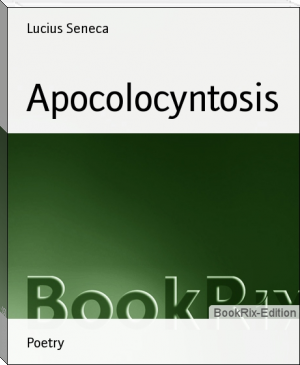Apocolocyntosis - Lucius Seneca (ebook reader .txt) 📗

- Author: Lucius Seneca
Book online «Apocolocyntosis - Lucius Seneca (ebook reader .txt) 📗». Author Lucius Seneca
INTRODUCTION
This piece is ascribed to Seneca by ancient tradition; it is impossible to prove that it is his, and impossible to prove that it is not. The matter will probably continue to be decided by every one according to his view of Seneca's character and abilities: in the matters of style and of sentiment much may be said on both sides. Dion Cassius (lx, 35) says that Seneca composed an [Greek: apokolokuntosis] or Pumpkinification of Claudius after his death, the title being a parody of the usual [Greek: apotheosis]; but this title is not given in the MSS. of the Ludus de Morte Claudii, nor is there anything in the piece which suits the title very well.
As a literary form, the piece belongs to the class called
Satura Menippea , a satiric medley in prose and verse.
This text is that of Buecheler, with a few trifling changes, which are indicated in the notes. We have been courteously allowed by Messrs Weidmann to use this text. I have to acknowledge the help of Mr Ball's notes, from which I have taken a few references; but my translation was made many years ago.
W.H.D. ROUSE.
BIBLIOGRAPHY
Editio Princeps: Lucii Annaei Senecae in morte
Claudii Caesaris Ludus nuper repertus: Rome,
1513.
Latest critical text: Franz Buecheler, Weidmann, 1904
(a reprint with a few changes of the text from
a larger work, Divi Claudii [Greek: Apokolokuntosis] in
the Symbola Philologorum Bonnensium, fasc. i,
1864).
Translations and helps: The Satire of Seneca on the
Apotheosis of Claudius, by A.P. Ball (with introduction,
notes, and translations): New York:
Columbia University Press; London, Macmillan,
1902.
SENECA
APOCOLOCYNTOSIS, OR LUDUS DE MORTE CLAUDII: THE PUMPKINIFICATION OF CLAUDIUS.
I wish to place on record the proceedings in heaven 1 October 13 last, of the new year which begins this auspicious age. It shall be done without malice or favour. This is the truth. Ask if you like how I know it? To begin with, I am not bound to please you with my answer. Who will compel me? I know the same day made me free, which was the last day for him who made the proverb true - One must be born either a Pharaoh or a fool. If I choose to answer, I will say whatever trips off my tongue. Who has ever made the historian produce witness to swear for him? But if an authority must be produced, ask of the man who saw Drusilla translated to heaven: the same man will aver he saw Claudius on the road, dot and carry one. [Sidenote: Virg. Aen. ii, 724] Will he nill he, all that happens in heaven he needs must see. He is the custodian of the Appian Way; by that route, you know, both Tiberius and Augustus went up to the gods. Question him, he will tell you the tale when you are alone; before company he is dumb. You see he swore in the Senate that he beheld Drusilla mounting heavenwards, and all he got for his good news was that everybody gave him the lie: since when he solemnly swears he will never bear witness again to what he has seen, not even if he had seen a man murdered in open market. What he told me I report plain and clear, as I hope for his health and happiness.
Now had the sun with shorter course drawn in his risen light, 2
And by equivalent degrees grew the dark hours of night:
Victorious Cynthia now held sway over a wider space,
Grim winter drove rich autumn out, and now usurped his place;
And now the fiat had gone forth that Bacchus must grow old,
The few last clusters of the vine were gathered ere the cold:
I shall make myself better understood, if I say the month was October, the day was the thirteenth. What hour it was I cannot certainly tell; philosophers will agree more often than clocks; but it was between midday and one after noon. "Clumsy creature!" you say. "The poets are not content to describe sunrise and sunset, and now they even disturb the midday siesta. Will you thus neglect so good an hour?"
Now the sun's chariot had gone by the middle of his way;
Half wearily he shook the reins, nearer to night than day,
And led the light along the slope that down before him lay.
Claudius began to breathe his last, and could not 3 make an end of the matter. Then Mercury, who had always been much pleased with his wit, drew aside one of the three Fates, and said: "Cruel beldame, why do you let the poor wretch be tormented? After all this torture cannot he have a rest? Four and sixty years it is now since he began to pant for breath. What grudge is this you bear against him and the whole empire? Do let the astrologers tell the truth for once; since he became emperor, they have never let a year pass, never a month, without laying him out for his burial. Yet it is no wonder if they are wrong, and no one knows his hour. Nobody ever believed he was really quite born. [Footnote: A proverb for a nobody, as Petron, 58 qui te natum non putat. ] Do what has to be done: Kill him, and let a better man rule in empty court." [Sidenote: Virg. Georg iv. 90]
Clotho replied: "Upon my word, I did wish to give him another hour or two, until he should make Roman citizens of the half dozen who are still outsiders. (He made up his mind, you know, to see the whole world in the toga, Greeks, Gauls, Spaniards, Britons, and all.) But since it is your pleasure to leave a few foreigners for seed, and since you command me, so be it." She opened her box and out came three spindles. One was for Augurinus, one for Baba, one for Claudius. [Footnote: "Augurinus" unknown. Baba: see Sep. Ep. 159, a fool.] "These three," she says, "I will cause to die within one year and at no great distance apart, and I will not dismiss him unattended. Think of all the thousands of men he was wont to see following after him, thousands going before, thousands all crowding about him, and it would never do to leave him alone on a sudden. These boon companions will satisfy him for the nonce."
This said, she twists the thread around his ugly spindle once, 4
Snaps off the last bit of the life of that Imperial dunce.
But Lachesis, her hair adorned, her tresses neatly bound,
Pierian laurel on her locks, her brows with garlands crowned,
Plucks me from out the snowy wool new threads as white as snow,
Which handled with a happy touch change colour as they go,
Not common wool, but golden wire; the Sisters wondering gaze,
As age by age the pretty thread runs down the golden days.
World without end they spin away, the happy fleeces pull;
What joy they take to fill their hands with that delightful wool!
Indeed, the task performs itself: no toil the spinners know:
Down drops the soft and silken thread as round the spindles go;
Fewer than these are Tithon's years, not Nestor's life so long.
Phoebus is present: glad he is to sing a merry song;
Now helps the work, now full of hope upon the harp doth play;
The Sisters listen to the song that charms their toil away.
They praise their brother's melodies, and still the spindles run,
Till more than man's allotted span the busy hands have spun.
Then Phoebus says, "O sister Fates! I pray take none away,
But suffer this one life to be longer than mortal day.
Like me in face and lovely grace, like me in voice and song,
He'll bid the laws at length speak out that have been dumb so long,
Will give unto the weary world years prosperous and bright.
Like as the daystar from on high scatters the stars of night,
As, when the stars return again, clear Hesper brings his light,
Or as the ruddy dawn drives out the dark, and brings the day,
As the bright sun looks on the world, and speeds along its way
His rising car from morning's gates: so Caesar doth arise,
So Nero shows his face to Rome before the people's eyes,
His bright and shining countenance illumines all the air,
While down upon his graceful neck fall rippling waves of hair."
Thus Apollo. But Lachesis, quite as ready to cast a
favourable eye on a handsome man, spins away by the
handful, and bestows years and years upon Nero out
of her own pocket. As for Claudius, they tell everybody
to speed him on his way
With cries of joy and solemn litany.
At once he bubbled up the ghost, and there was an end to that shadow of a life. He was listening to a troupe of comedians when he died, so you see I have reason to fear those gentry. The last words he was heard to speak in this world were these. When he had made a great noise with that end of him which talked easiest, he cried out, "Oh dear, oh dear! I think I have made a mess of myself." Whether he did or no, I cannot say, but certain it is he always did make a mess of everything.
What happened next on earth it is mere waste of 5 time to tell, for you know it all well enough, and there is no fear of your ever forgetting the impression which that public rejoicing made on your memory. No one forgets his own happiness. What happened in heaven you shall hear: for proof please apply to my informant. Word comes to Jupiter that a stranger had arrived, a man well set up, pretty grey; he seemed to be threatening something, for he wagged his head ceaselessly; he dragged the right foot. They asked him what nation he was of; he answered something in a confused mumbling voice: his language they did not understand. He was no Greek and no Roman, nor of any known race. On this Jupiter bids





Comments (0)